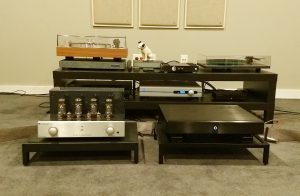Roger Skoff writes about HiFi and the Music Business
Many a long year ago, when I was still in school (Frankly, I don't remember whether it was high school or college) somebody (again, I don't remember who) told me that if I wanted to get rich, I should go into business and sell either water or paper.
If I chose water, my unremembered mentor told me, it must, of course, have some flavoring in it or possibly some cleaning agent or something else to make people want to buy it. (Think of Coca-Cola as the flavored version and perhaps Windex or Mr. Clean as an example of the other). And if I chose paper, he said, the paper—with the possible exception of TP, which everyone needs and buys just as it is—would also need to have something added to it to make people want to buy it: perhaps words, pictures, diagrams or formulae to make it informational, or different words to make it poetic, or repetitive pretty patterns, so that people would want to paste it—as wallpaper—on the walls of their home as a decoration.
Whichever of those I chose, I was told, if I could find a good enough reason for people to want to buy it, it would certainly make me a fortune.
Although I never personally followed that advice, I have certainly seen it work for others; creating fortunes for novelists, poets, publishers, scientists, artists, drink manufacturers, and any number of other people who have found the right thing to add to their paper or water. I've even seen it work in some cases where people have added nothing at all except social acceptability or the lure of good health and have made fortunes by selling "pure" drinking water of whatever pricey and exotic brand.
It's exactly the same with the music business, which—at least as seen by the "suits" who have for so long controlled so much of it—is less and less about the music and more and more about selling pieces of plastic (discs, tape, etc.) or, increasingly, computer downloads, to which some music has been added as the "flavoring" or the special ingredient to make people want to buy them.
Of course the artists—the people who actually write or perform the music—don't always feel this way. As sales of physical media decline, though, to be increasingly replaced by other sales formats with what are claimed to offer only miserly and unfair rates of pay, the artists and the others behind them seem to be growing more and more unhappy, and they, too, are coming, if for no reason other than financial necessity, to see music more as a business than as an artform or a means of expression.
Radio is another thing that adds something to something else in order to sell it: The radio stations add music (or news, or sports, or whatever) to air-time in order to sell commercials and, just as the "plastic" sellers (some call them "music companies") would if, people would buy it, be just as happy to sell their plastic all by itself, with no music on it at all—so the radio stations would be perfectly happy to fill their air-time only with commercials, and leave the music (or whatever else) out entirely.
For radio stations, the only thing that matters is the number of ears that they can claim to be listening to their programming at any given time. That's what determines what they can charge for their commercials and, because the music they play can determine that number of ears, what the music is and how it sounds is of real importance to them. Similarly, because radio is one of the very most important sources of people who hear music and then want to buy it, there's a great deal of interaction between radio stations and music producers.
No, that's not to say that the radio stations actually sit down with the artists or the record companies to determine what music ought to be played and recorded. It's much more subtle than that, but it's real, just the same: Radio stations can't tolerate "dead air"—silences between the end of one thing and the start of another—that's why they always have "bumper music", even for talk shows, and why everything on the station must always be as loud as possible.
For radio, how loud the sound is will determine the output of the transmitter; which will, in turn, play a part in determining how far away from the transmitting antenna the station's programming can be heard; which will determine the size of its potential audience; which will play a strong part in determining what its commercials will cost and how easily it can sell them; which will determine, ultimately, the station's financial success or failure. Loud is important to radio!
And that's how radio finally comes to affect our HiFi hobby. Have you heard of "the decibel wars"? That's what has come about from record companies and artists wanting their stuff played on the radio: In order to ensure that the station will always be playing as loud as possible, and thus have the best "reach", recording engineers and producers have gotten into the habit of "compressing" the dynamic range of, at least, all of their popular music recordings so that the difference between the loudest and "softest" parts is as little as possible—sometimes just a very few dB.(Classical music, too, can be compressed, but usually for a different reason—either to prevent overloading on peaks or crescendos or, particularly on re-mastered older recordings, to "bury" unwanted background noise.)
Another way recordings can try to cater radio stations and thus get greater "air-play" is by boosting the bass. Obviously, this is most common on "pop" recordings, but others do it, as well: Don't forget the famous Telarc drum, which overbalanced everything, and often didn't work at all, musically, but, because it was well-recorded and would make even a car radio sound good, certainly got lots of air-play and sold lots of recordings.
All of that makes sense: Big bass and compression does help radio, and radio play does help the sales of recordings and ultimately puts money in the hands of the artists, where it belongs. I can understand that, to a record company, the music is just what you put on the plastic to make it saleable or to get airplay by helping radio stations to sell commercials, but why, in recent times, can't any but the small, audiophile-oriented record companies understand that music fans love the music for what it is; that audiophiles love it for its sound, as well as its other glories; and that an important part of both that music and that sound is realistic— "head crushing" only when that's the way it really is—bass and the kind of realistic dynamic range that music naturally has and we spend thousands of dollars to be able to reproduce?
Isn't the music ultimately more important than the plastic?






































